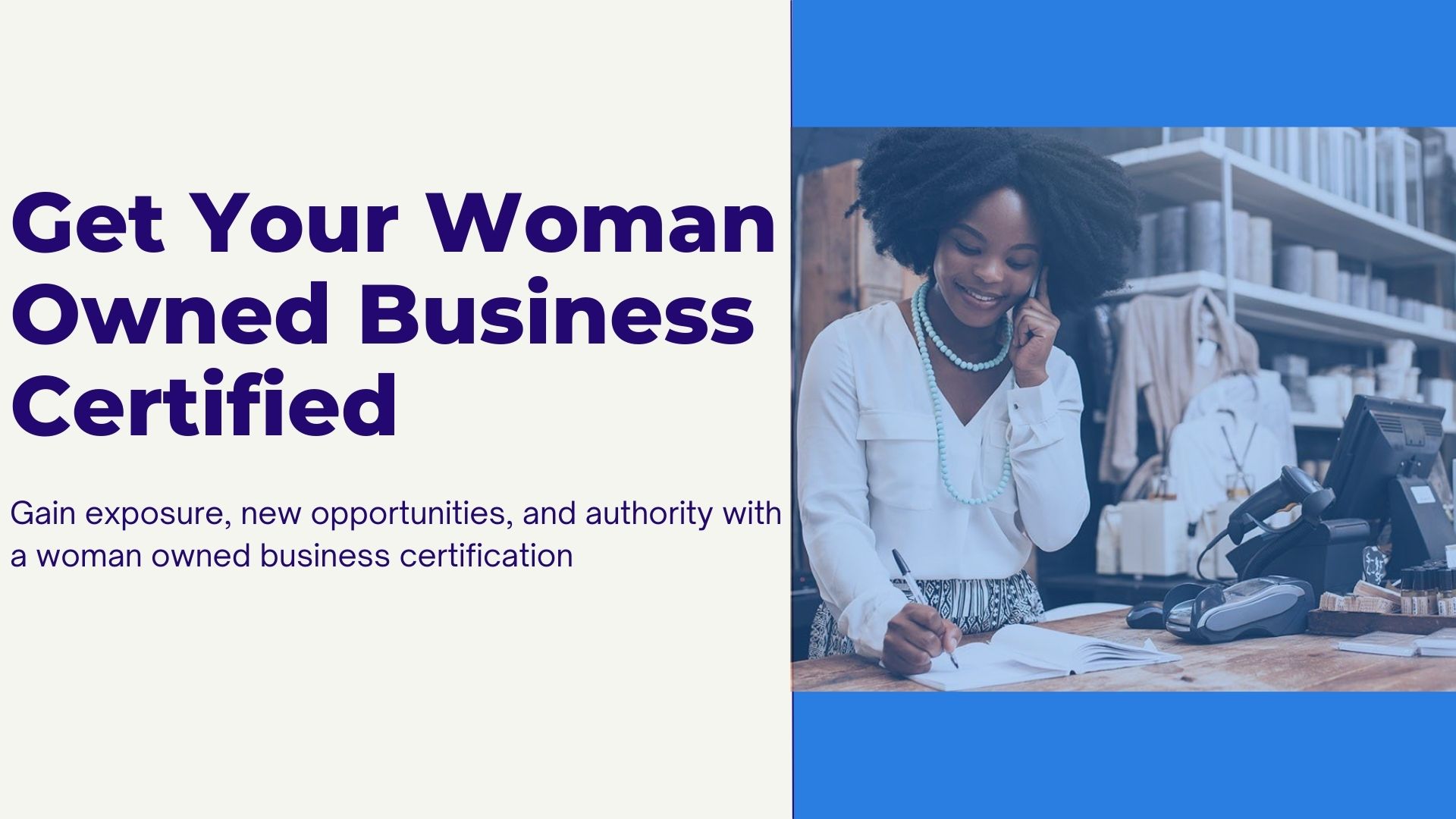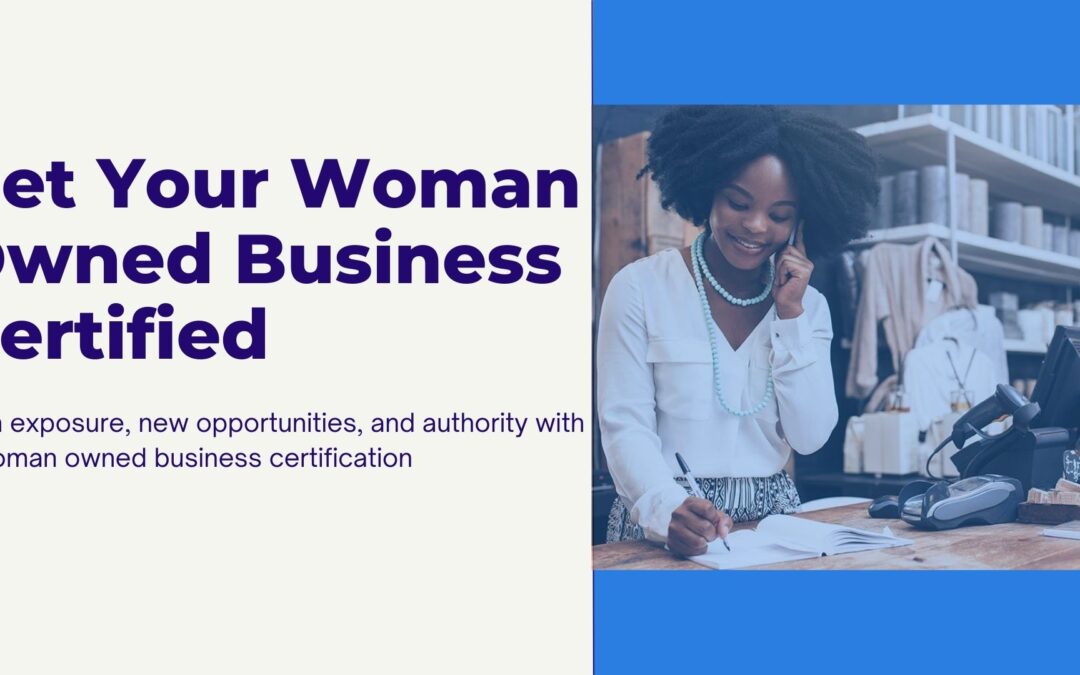
Women entrepreneurs should be actively engaged in driving their business growth. One of the best ways to drive growth and open up new opportunities for your business is to get your woman-owned business certified.
Woman-owned businesses and entrepreneurship are growing at an incredible rate. According to American Express’ 2019 State of Women-Owned Businesses Report, the number of women-owned businesses increased 21% between 2014 and 2019. That’s 12% higher than the 9% growth rate for overall businesses in general.
Getting your woman-owned business certified opens up growth opportunities and exposure for your business as well as mentorship, training, and educational opportunities.
What are women owned business certifications?
Let’s take a deeper look into women-owned business certifications in celebration of National Women’s History Month. This article explains what types of certifications are out there, what you need to apply, and how getting your woman-owned business certified will support your business.
Why Should I Certify My Woman-Owned Business?
Financial Benefits
It’s honestly a great question to ask! Certifying your woman-owned business comes with a lot of actual and potential future benefits, financial benefit being a top reason to certify. Many business certifications give your business access to opportunities that you wouldn’t have access to otherwise.
The US Federal Government, for example, has a goal of spending 5% of all federal contracting dollars with small women-owned businesses. The only way to become part of that pool of eligible businesses is to get your business certified as woman-owned.
Some types of business certifications also give you the ability to bid on exclusive contracts. These opportunities allow you to build your client pool and access projects that you wouldn’t have had access to otherwise. Women Owned Small Business (WSOB) Certification gets your business access to profitable government contracts.
Networking, Training, and Mentorship Opportunities
While financial incentive is often a top driver for certifying your woman-owned business, there are other benefits as well. Getting your business certified provides access to networking, mentorship programs, training and educational programs. Most certifying bodies are interested in the health and well-being of your business in the long-term, and offer programs and opportunities that help your business grow and succeed over time.
Authority and Credibility
Women-owned business certifications give your business both authority and credibility, especially when dealing with other private sector buyers or partners. Many organizations only partner with businesses that have been certified. You can use your woman owned business certification as a marketing piece to get the attention of organizations who are looking to work with more women-owned businesses.
Which Woman-Owned Business Certification is Right for My Business?
Now that you understand why you should get your woman-owned business certified, let’s get into the different types of certifications that exist and which ones are right for your particular business.
There are several different types of business certifications available to women owned businesses and several certifying bodies and organizations:
Women Owned Small Business (WOSB) and Economically Disadvantaged Women Owned Small Business Certification (EDWOSB)
This is a national certification that allows your woman owned business to compete for federal contracts and get a part of that elusive 5% spend that the Federal Government has reserved for woman owned businesses.
In order to qualify as a WOSB, your company must:
- Be a small business according to SBA size standards
- Be at least 51% owned and controlled by women who are U.S. citizens
- Have women manage day-to-day operations who also make long-term decisions
To qualify as an EDWOSB within the program, a business must:
- Meet all the requirements of the WOSB Federal Contracting program
- Be owned and controlled by one or more women, each with a personal net worth less than $750,000
- Be owned and controlled by one or more women, each with $350,000 or less in adjusted gross income averaged over the previous three years
- Be owned and controlled by one or more women, each with $6 million or less in personal assets
There are two different ways to certify your business as a WOSB or EDWOSB: certification through the SBA website or third-party certification.
Certifying Your Woman-Owned Business as a WOSB or EDWOSB through the SBA
To certify directly with SBA, all relevant documentation will need to be uploaded to the SBA website, and you’ll need to answer questions related to your business.
The following documentation is required by the SBA for WOSB certification:
- Active System for Award Management (SAM) registration for the company (registration available at SAM.gov)
- Proof of U.S. citizenship (for example, a birth certificate, naturalization paper, or unexpired passport) for qualifying individual(s).
- Resume (optional)
- Joint Venture agreements (when applicable)
- Corporations will need to provide:
- Articles of Incorporation
- Copies of stock certificates (front and back)
- Stock Ledger
- Corporate Bylaws and any amendments
Limited Liability Company (LLC) will need to provide:
- Operating Agreement and any amendments
- Articles of Organization and any amendments
Partnerships will need to provide:
- Partnership Agreement and any amendments
- Sole Proprietors will need to provide:
- DBA (Doing Business As) or Trade Name Certificate
EDWOSBs applicants, in addition to the above, must also provide personal financial information for every woman claiming economic disadvantage (and, when applicable, each woman’s spouse), including:
- A completed and signed IRS Form 4506-T, Request for Tax Transcript
- Three most recent personal income tax returns (IRS Form 1040) including all schedules
- Three most recent W-2’s
- Detailed information on the value of all assets (including cash on hand and in banks, retirement accounts, accounts and notes receivable, stocks, bonds, real estate, personal property, life insurance, and any other assets), liabilities (for example, mortgages, personal loans, tax debts, and any other liabilities), and income (including salary, real estate income, investment income, and any other income)
Third Party Woman-Owned Business Certifications
There are currently four organizations approved by the SBA to provide third-party certification to women owned businesses:
- El Paso Hispanic Chamber of Commerce
- National Women Business Owners Corporation
- US Women’s Chamber of Commerce
- Women’s Business Enterprise National Council
Once you receive your certification through an SBA-approved third-party certifier, you’ll need to provide proof of certification through the SBA portal.
Woman Business Enterprise (WBE) Certification
If your business is looking for private sector opportunities, Woman Business Enterprise (WBE) certification is worth looking into.
While the criteria for applying for WBE certification is similar to WOSB certification (your business must be 51% owned, operated, and controlled by a woman or a group of women); WOSB certification only applies to the Federal Government.
There are two main entities that issue WBE certifications:
- National Women Business Owners Corporation (NWBOC)
- Women’s Business Enterprise National Council (WBENC) (based in Washington, DC, WBENC also has 14 regional partner organizations spread throughout the US)
Both certifying organizations require businesses applying for WBE certification to submit an application along with relevant documentation (including business paperwork, financial documentation, and proof of citizenship). Both the NWBOC and WBENC have fees associated with the application process.
According to the NWBOC’s FAQ page, the application fee is $400. If your business is applying for a combination of two different certifications, the application fee is discounted to a combined cost of $700.
For WBENC certification, fees range between $350 and $1250, based on company revenue.
WBE certifications are valid for one year, and you’ll need to go through a renewal process each year to keep your certification current.
SupplierGateway introduced its Enhanced Digital Certification® (EDC) in 2021. This certification is recognized by an increasing number of private sector and public sector organizations, and is certainly worth looking into. The certification can be purchased for one or three years, and the cost is $25 for one year or $75 for three years.
The application process is entirely online, requires no site visits, and there are no minimum requirements for the size of your business (meaning you can have 1 or 10,000 employees and be covered by this certification).
EDC is also an all-in-one certification, meaning if you are a minority woman-owned business, you only need one certification to attest to your minority and woman-owned status. This certification is not a WBE certification; Enhanced Digital Certification® is in a different class all on its own.
WOSB vs. WBE: Which Certification is Right for My Woman-Owned Business?
The certification process for both programs is time-consuming, so make sure your business will reap the benefits of certification before going through the application process.
Before you decide which certification is the best fit for your business, it’s important to clarify what benefits are most important to you and your business. Do you want to be able to bid on federal contracts? Are you looking for more opportunities in the private sector? Are training, education, and networking opportunities important to you?
Each woman owned business certification has a specific set of benefits. Take the time to evaluate exactly how your business is hoping to benefit from certification should point you in the right direction.
Are you looking to engage the Federal Government, private sector organizations, or both?
If you’re only interested in federal contracts, a WOSB certification would fit your needs. If you’re looking to increase your opportunities in the private sector, then a WBE certification would be more beneficial. If you’re looking to interact with the Federal Government and private sector organizations, you may want to consider getting both certifications. Also keep in mind that state and local governments often have their own set of certification requirements. If you’re looking to engage on the state or local level, be sure to find out what these certification requirements are.
Tips for Getting Your Business Certified
If you’re considering certification for your woman-owned business, there are a few tips to keep in mind when researching and preparing for certification.
- Explore all your options
There are several options available for getting your woman owned business certified. Understanding each certification’s requirements and how being certified will benefit your business is important.The application process for each certification is often quite time-consuming and may come along with fees. Exploring and understanding each certification will help you avoid investing time and money on a certification that ultimately may not benefit your business the way you hoped it would.
For example, if your end goal is to engage more clients in the private sector, getting a WBE certificate or an Enhanced Digital Certification® from SupplierGateway would probably be the most beneficial.
- Get any required licensure in order
Your business may be required to hold a specific license depending on the industry. Make sure any licensing requirements are up to date and correct before proceeding with any certification applications.
- Gather all the necessary paperwork and documentation before you start the application process
As noted above, the list of documentation required for certification is quite long. Trying to gather all of this documentation while going through the application process can be time-consuming and confusing. Oftentimes the application process has a time limitation, and not having your documents in order could cause you to miss an application deadline. If you miss this deadline, you’ll have to start the process over again.
Getting your woman owned business certified is a great way to accelerate the growth of your business. Now that you understand the ins and outs of getting your business certified, it’s time to get the application process started. Take your time, be thorough, and be patient. The benefits that come from certifying your woman owned business are worth the effort.












